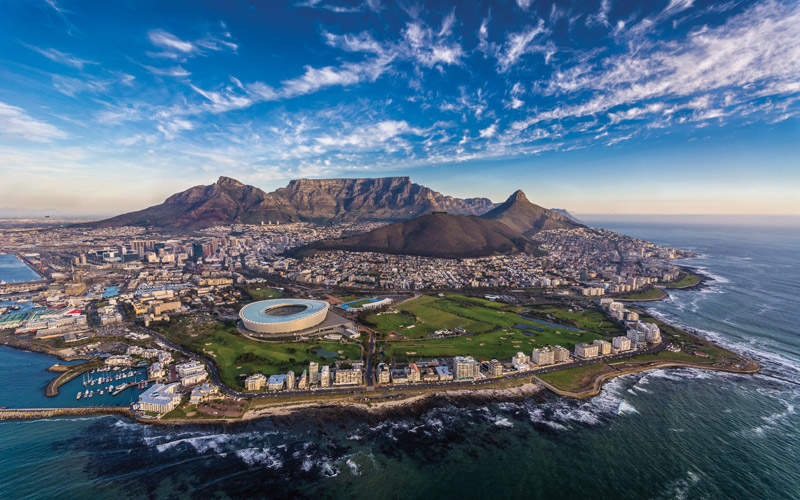The diamond showroom where you can polish your own stone





Food for Thought
Urban farming: cultivating real change in Cape Town
For many a Mother City resident, food is something taken for granted. It comes steaming off our mothers’ stovetops as children, and flies off supermarket shelves and swanky restaurant menus in our later years.
But more so than ever before, with meat mislabelling scandals having rocked Europe and South Africa in 2013, people are becoming increasingly hesitant to simply accept fare with open mouths. Those who, in the past, couldn’t care less are beginning to ask pertinent questions about where their food comes from, what it contains, how it’s cultivated and produced and just what the broader consequences are of importing truckloads of it from regions miles beyond the city’s borders.
These concerns about transparency are certainly a welcome change, but even so, such questions are still a luxury of the affluent, especially in a Cape Town where issues around food insecurity far outweigh those around food integrity. That is, with poverty still a major dilemma, a significant number of starving Capetonians are less anxious about where their meals comes from and more concerned about whether their meals come at all. To offer up one shocking statistic, a 2011 report compiled by Dr Jane Battersby showed that an average of 80% of households surveyed in select township areas lack access to sufficient provisions and often go hungry.
In both cases though, the problem essentially comes down to our heavy reliance on external sources for grub. It’s only logical then that a selection of initiatives committed to putting the power of food production back into the hands of the people have sprung up in Cape Town over time.
The oldest and perhaps most successful of such projects is Abalimi Bezekhaya (Farmers of Home), an inspiring urban agriculture organisation based in the Cape Flats townships. Founded during Apartheid in 1982, the venture assists thousands of individuals and groups from these barren, impoverished areas to set up and maintain home and community (shared) gardens on tiny fragments of city land so that they can cultivate their own juicy vegetables in their backyards. With a focus on organic micro-farming (sans chemicals and fertilizers), the enterprise, which provides training and start-up packs, looks to improve the hungry’s access to nutrient-rich, non-poisoned food that can supplement a very restricted diet.
“There’s absolutely no reason for food insecurity anywhere,” asserts Abalimi Co-director Rob Small, a charismatic man who firmly believes that the only major hurdle to keeping the poor full and fed is a deeply entrenched mindset that places no value on small-scale farming in built-up areas. “Just 100m2 can feed a family of four year round with all the fresh veggies they could dream of.”
But filling starving bellies isn’t the only aim of the association; it also seeks to use urban agriculture to generate income for the unemployed. Hence, Harvest of Hope, a social business under Abalimi that’s the first of its kind in SA, was established in 2008 with the aim of selling produce that’s picked from the community gardens to wealthier Cape Town customers. Verdant crates of fruits and veggies are delivered to drop-off points weekly, and a significant portion of the profits goes straight back into contracted gardeners’ pockets.
Through such a scheme, locals who aren’t inclined to nurturing their own nibbles can still reap the benefits by supporting local production – a practice that Rob feels is as, if not more, important than having every individual setting up their own little green patch.
Stephen Lamb, owner of Touching the Earth Lightly, an initiative that aims to reconcile humans and nature through design, shares this sentiment.
“People mustn’t plant plants, they must plant vegetables, plant food,” says the Cape Town designer-cum-environmentalist. “And if they don’t, they must buy from people that do.”
Alongside working on a broad array of other collaborative projects, Stephen has partnered with the City of Cape Town to pilot a rooftop gardening scheme in the City Bowl – there’s one at 44 Wale Street already – that will employ disenfranchised individuals to cultivate mushrooms and microgreens that are sold to restaurants and delis down below. Still in the planning phase, the programme will work to counter the huge carbon cost (and absurdity) of the city’s reliance on importing vegetables from areas hundreds of kilometres away, which is not only detrimental to the integrity of the produce – it sits in plastic in cold storage units for weeks – but also entirely unnecessary considering that there are, in the founder’s words, “acres of farm” in the form of empty, unused rooftop space in the otherwise crowded CBD.
Though this particular project is more focused on job creation than food security, in a similar way to Abalimi Bezekhaya, it also endeavours to empower Mother City dwellers, to cultivate a culture of people that are more connected to their food source and the life-giving soil beneath their feet, and to gently remind our disengaged generation that food comes from the ground, not from pricey supermarket packets.
“We get gifts from nature for free every day – we don’t pay for photosynthesis, for soil, for rain or any of the natural elements that make plants grow,” says Stephen, making a point to emphasise that, despite the way this observation sounds, he harbours no hippie ideologies. “So, we can choose to live our lives differently, we don’t need to buy into this consumerism lie which has everybody by the neck.”
That is, urban farming, he feels, is a movement that, apart from being super sustainable, can help residents to rekindle an appreciation for the wholesome, the transparent and the honest, and to return, on some level, to a slightly simpler way of being – “simple is cool, complex is easy,” he says.
Essentially, what Stephen seems to be espousing is a vision of a generation of self-reliant individuals that take more control of and responsibility for what they put in their mouths (rather than leaving it in retailers’ hands). In his perfect world, he sees Cape Town as an autonomous city that boasts a thriving local economy and a mass of well-nourished citizens that are as rooted, plump and healthy as the veggies they’re personally producing.
And fortunately, with a mushrooming number of sustainable food production projects now budding in the Mother City, this dream may not be such a distant reality. New instances, like the Oranjezicht City Farm, an inner-city organic garden on the slopes of Table Mountain, and Touching the Earth Lightly’s yet-to-be-launched Green Shack initiative, which will see vertical vegetable patches set up on the sun-facing walls of township quarters, are lending great weight to a very socially significant trend.
So, food insecurity may still seem like an insurmountable issue to conquer, and, realistically, we may still rely on those elusive outside sources for fare for many years to come, but we can certainly take some comfort in the fact that the option of growing our own greens has the potential to harvest real change in our pretty fertile city.
Partnering with Harvest of Hope
Mother City residents interested in signing up for a weekly delivery of fresh seasonal veggies from Harvest of Hope can do so online via the organisation’s website (Harvestofhope.co.za). Patrons can choose between a small (8 items) or medium box (10 to 12 items) for R72 or R105 respectively, and these cartons, which overflow with anything from brinjals, carrots and salad leaves to green peppers, spring onion and spinach, are delivered every Tuesday to a number of collection points around Cape Town (listed on the site).
By Dayle Kavonic
Photo credits: ‘Harvest of Hope Veg Box’ by Patrick West for Abalimi.org.za and ‘Typical Community Garden on School Grounds’ by Abalimi.org.za.
---
COMING IN JULY: Country-style nose-to-tail dining at Viande.
Interested in the notion of taking charge of your own situation? Read about a Noordhoek resident living almost entirely off the grid.
---
Also, don’t forget to follow us on Twitter, like us on Facebook, and check out our Pinterest boards for updates. Not to mention, subscribe to our newsletter to keep up to date with what's hip and happening in our pretty city.







